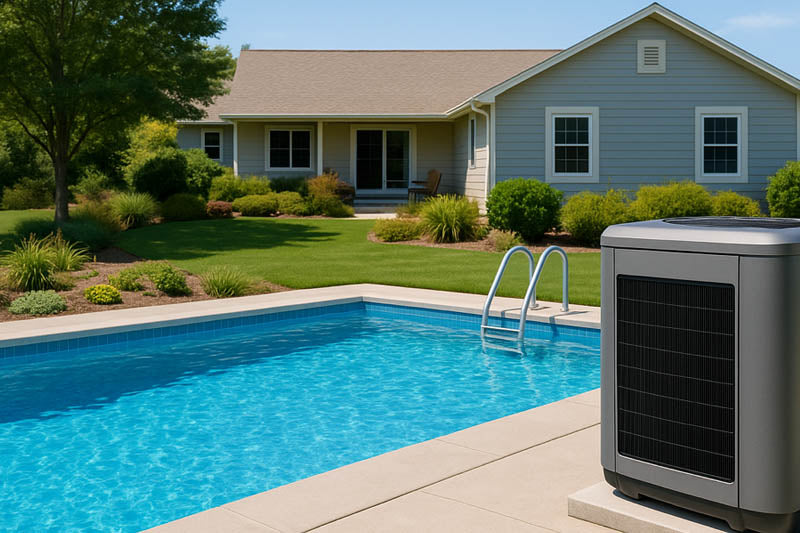
Pool Heat Pump FAQs
Share
Thinking about adding a pool heat pump? Here are the most common questions people ask, answered simply and clearly. If you're trying to decide if a pool heat pump is right for you, this FAQ will help.
Are heat pumps worth it for pools?
Yes. Pool heat pumps are energy efficient, cost-effective in the long run, and ideal for maintaining a steady water temperature. While the initial cost is higher than gas heaters, they use ambient air to heat water, which keeps energy bills lower month after month.
What are the disadvantages of a pool heat pump?
The main downsides are slower heat-up times and reduced efficiency in cold climates. If you live somewhere with cooler air temperatures, a gas heater might heat your pool faster. But for most homeowners, heat pumps offer better efficiency and reliability over time.
What size pool heat pump do I need for my pool?
Pool size, location, and whether or not you use a cover all matter. Generally, smaller pools around 10,000 to 15,000 gallons need a 50,000 BTU unit. Larger pools over 25,000 gallons usually need a 100,000 BTU or higher. Always check with your installer or use a manufacturer’s sizing chart.
How much does it cost to add a heat pump to a pool?
Most installations range from $2,500 to $5,500. The unit itself typically costs $2,000 to $4,000 and professional installation adds another $500 to $1,500 depending on the setup. Over time, the lower energy use can save you hundreds annually.
How long does it take a heat pump to warm a pool?
That depends on your starting water temperature and the size of the pool. Most heat pumps raise water temperature by about 1 to 1.5 degrees per hour. Using a pool cover can significantly speed up the process and help retain heat overnight.
Can I use a heat pump year-round?
In warmer climates, yes. Pool heat pumps work best when air temperatures are above 50°F. If you live in a colder region, you may want to pair your heat pump with a solar cover or consider switching to a gas heater during colder months.
Do pool heat pumps work at night?
Yes, but they are less efficient in cooler evening air. Most heat pumps are most effective during the daytime when the air is warmest. Using a solar blanket or pool cover at night helps retain heat gained during the day.
What is the life expectancy of a pool heat pump?
Most pool heat pumps last between 10 and 15 years with proper maintenance. Keep the coils clean, check refrigerant levels, and ensure proper airflow around the unit for the best results.
Do pool heat pumps work with saltwater pools?
Yes, most pool heat pumps are fully compatible with saltwater systems. Just make sure the unit has corrosion-resistant components, like a titanium heat exchanger, to prevent long-term damage from salt exposure.
Can a heat pump cool the pool water too?
Some high-end models offer both heating and cooling functions. These reversible heat pumps can lower water temperature during extreme heat, keeping your pool comfortable all summer. If cooling is important to you, check product specs before buying.
Is it better to run a pool heat pump during the day or at night?
Heat pumps work best during the day when the air is warmest. Running them during daylight hours increases efficiency and reduces strain on the unit. Using a solar blanket or cover at night helps retain the heat you’ve added.
👉 View AquaDoc's selection of swimming pool heat pumps
Need help choosing the right pool heat pump? Contact our team or browse our collection of energy-efficient pool equipment.
